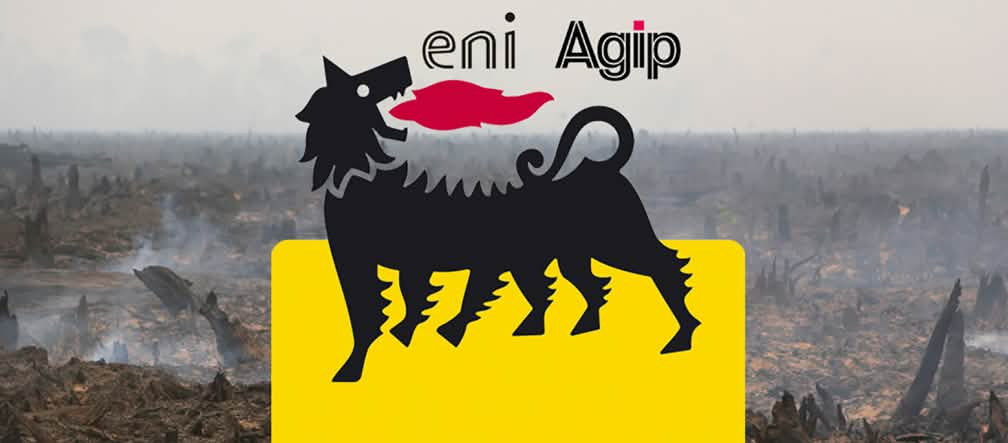
Completed campaign
Eni: stop trashing the rainforest for “green” fuel!
The Italian Eni energy group is selling a new, supposedly sustainable diesel fuel that contains 15% palm oil. Diesel+ has been available at 3,500 Eni service stations since mid-January. Yet the fuel is anything but "green" – the plantation industry that supplies Eni's palm oil is the worst driver of deforestation in Southeast Asia.
To: the Italian government and Eni senior management: Chairperson Emma Marcegaglia, CEO Claudio Descalzi
“Eni’s new 15% palm oil diesel is a threat to the rainforest – take it off the market now!”Eni touts its new Diesel+ fuel, which contains 85% fossil oil and 15% hydrotreated palm oil, as a “great example of ... sustainable innovation”.
The palm oil fuel is being produced in Marghera, near Venice, in an old refinery that Eni converted for use with biofuels. Tankers from Southeast Asia unload the palm oil in the town’s port. Eni is currently building a second “green refinery” in Gela on Sicily.
According to Eni, the two facilities will process 710,000 tons of vegetable oil a year for an annual output of 530,000 tons of biofuel.
According to a Greenpeace study, the plantation industry is the main cause of deforestation in Southeast Asia. Vast swathes of rainforest are continually being cut down or torched to make room for uniform oil palm monocultures. Endangered animals and plants have no place these green deserts – nor do indigenous people, who often lose their ancestral land and their livelihoods.
Studies made on behalf of the European Commission warn that the production and use of biodiesel from palm oil results in three times the carbon emissions of fossil diesel.
Eni’s drilling for fossil oil in Nigeria has an equally disastrous environmental impact. According to Amnesty International, Eni caused 349 oil spills in the Niger Delta in 2014 alone.
Italy’s biofuel consumption in 2014 amounted to 1.2 million tons of biodiesel and 11,700 tons of ethanol. At 570,000 tons (47%), palm oil is the most common raw material for biodiesel, followed by rapeseed oil (27%).
Eni operates more than 5,800 service stations in Europe. The Italian state holds a 30% stake in the company. Please call on Eni and the Italian government to stop the production of biofuel from palm oil immediately.
According to Eni, 144,000 tons of raw palm oil were converted to hydrotreated palm oil in its Venice refinery and blended with fossil diesel in 2014. As of 2017, Eni plans to process 560,000 tons of palm oil in order to produce 420,000 tons of biofuel annually. When the construction of Eni’s biofuel refinery in Gela on Sicily is completed, Eni’s vegetable oil consumption is set to rise to a total of 710,000 tons per year, from which it will produce 530,000 tons of biofuel.
Italy imports around 1.8 million tons of palm oil annually (2014), putting it in second place in the EU after the Netherlands with 2.3 million tons.
Eni’s arguments vs. Rainforest Rescue’s position
Eni, which advertises its Diesel+ fuel as “sustainable”, did not respond to our request for further information.
Rainforest Rescue: A fuel that contains an 85% share of fossil oil is not sustainable by definition. Fossil oil is a finite resource. Palm oil produced in tropical rainforest regions is also anything but “green”, considering the plantation industry’s role as the biggest driver of deforestation in Southeast Asia.
According to Eni, palm oil is already commonly used for the production of biofuels in order to meet the requirements of the EU’s Renewable Energy Directive. Previously, the group had purchased one million tons of biofuel from other producers on the European market. Thanks to the “excellent properties of its green diesel” Eni now claims to need less biofuel for blending with its fossil fuel, reducing its palm oil consumption by 15%.
Rainforest Rescue: The EU aims to have seven percent of the transport fuels used in every EU country come from renewable sources such as biofuels by 2020. It does not, however stipulate the use of palm oil. Eni is trying to create the impression that all biofuel producers in Europe rely on palm oil as raw material.
A study by the US Department of Agriculture on biofuels in Europe paints a different picture: in 2015, rapeseed oil was the most commonly used oil for biofuel production at 5.97 million tons (54%) followed by recycled vegetable oils (used deep-frying oils from restaurants, etc.) at 1.65 million tons (14.9%). Palm oil was only in third place at 1.63 million tons (14.7%). Furthermore, the 15% savings of palm oil Eni claims refers to the energy content of hydrotreated palm oil as compared to first-generation biodiesel (fatty acid methyl esters, FAME). The savings in palm oil consumption is thus merely a matter of creative accounting.
It is therefore likely that Eni’s use of palm oil is a simple business decision: Palm oil is cheaper than other vegetable oils and can be delivered in in large quantities by ship from Southeast Asia.
Eni states that palm oil is its initial raw material for biofuel production, but that animal fats, used deep-frying oils, oils derived from algae and various types of biomass will be used in future.
Rainforest Rescue: Eni is trying to downplay the use of palm oil by creating a vision of the future without providing any details about quantities and time frames. The fact is that Eni converted 144,000 tons of raw palm oil to hydrotreated palm oil in 2014 alone, and that the demand of its two bio-refineries for raw vegetable oil is set to increase to 710,000 tons a year by 2017. While Eni does not elaborate about the share of other raw materials in future, there is little doubt that palm oil will continue to play a central role.
Furthermore, Eni claims that its palm oil complies with European certification standards to prevent the destruction of land with high biodiversity and capacity for carbon sequestration and ensure that human and land rights are respected.
Rainforest Rescue: The EU requires the certification of raw materials used for biofuels and currently recognizes 19 different certification labels. Whether these voluntary schemes are truly adequate in practice to prevent deforestation or the establishment of oil palm plantations on the ancestral lands of smallholders and indigenous peoples is a highly contentious issue. For example, environmentalists the world over consider certification by the Roundtable for Sustainable Palm Oil (RSPO) – a label recognized by the EU – to be pure greenwashing. Greenpeace goes as far as to accuse the RSPO of “certifying destruction”.
Certification labels are bureaucratic constructs that have little to do with realities on the ground in Southeast Asia. They generally presume that rainforest land has been completely surveyed in terms of geography and forest condition, that land rights have been clarified, and that rule of law prevails in governance in production countries. Indonesia, Malaysia and Papua New Guinea come nowhere near fulfilling these requirements.
Furthermore, the labels rely on private companies to verify compliance with the certification criteria. Since the auditors work on behalf of the palm oil industry and its customers and are paid by them, they cannot be deemed independent. In the view of the Environmental Investigation Agency (EIA), many of the certification schemes are critically flawed. According to Greenpeace, the first company to receive RSPO certification, United Plantations, is guilty of serious offenses such the destruction of rainforests and peat forests, as well as land conflicts.
“Green” warships?
It appears that Eni has found another customer for its palm oil biofuel in the Italian navy. A 50% “green diesel” blend has been successfully tested by the military on the warship Foscari. Both Eni and the Italian navy are now touting the blessings of a “green fleet”.

To: the Italian government and Eni senior management: Chairperson Emma Marcegaglia, CEO Claudio Descalzi
Ladies and Gentlemen,
We urgently call on you to discontinue the production of biofuels based on palm oil.
Cultivation of oil palms is the biggest driver of deforestation in Southeast Asia. The environmental certifications that Eni lists are not effective at ruling out the destruction of rainforests and other vital ecosystems for the production of palm oil.
We also urge you to stop the misleading advertising of your “sustainable” Diesel+ fuel. A fuel that contains an 85% share of fossil oil and 15% palm oil is not sustainable by any measure.
Eni’s drilling for fossil oil in Nigeria has had an equally disastrous environmental and social impact. According to the human rights organization Amnesty International, Eni caused 349 oil spills in the Niger Delta in 2014 alone.
Kind regards,

